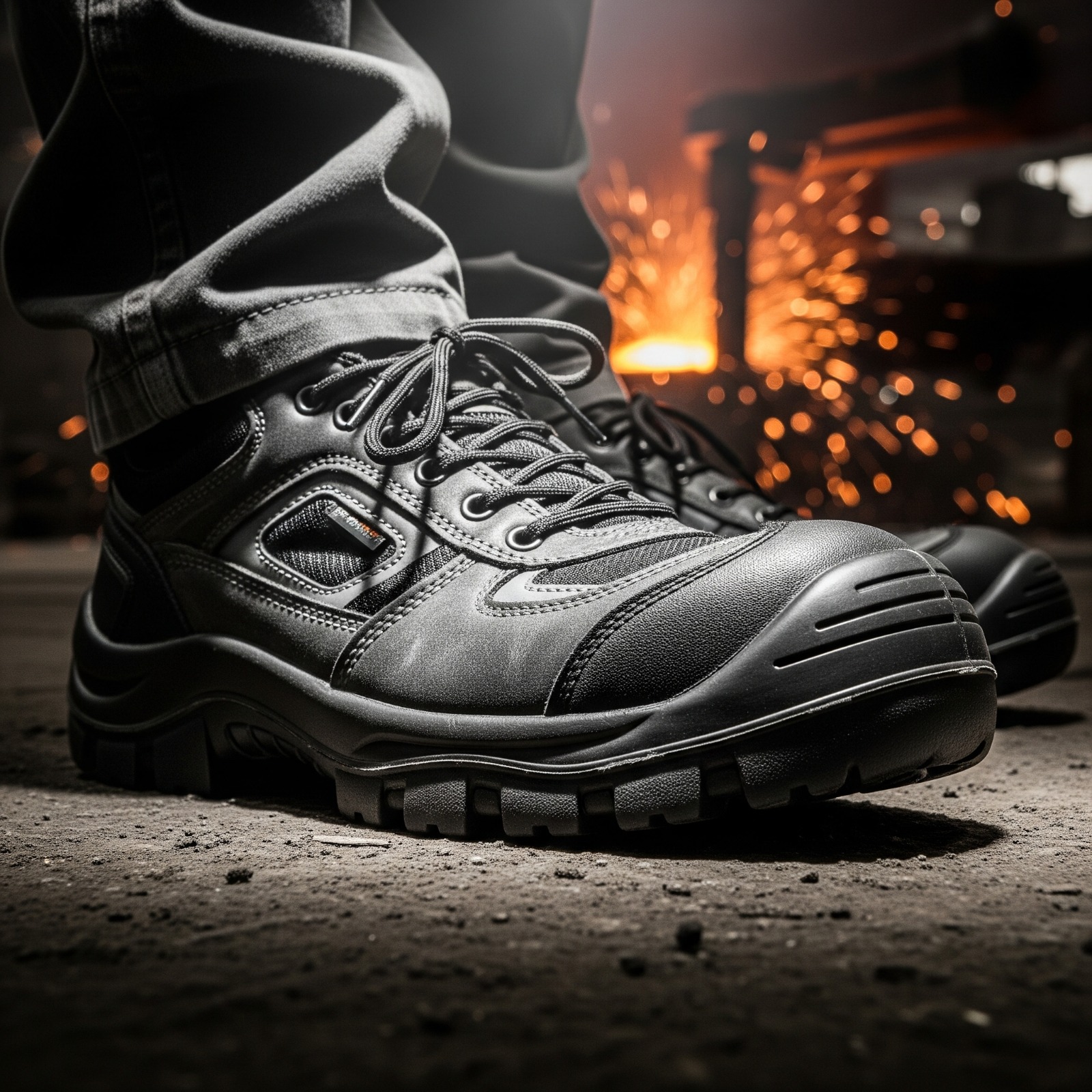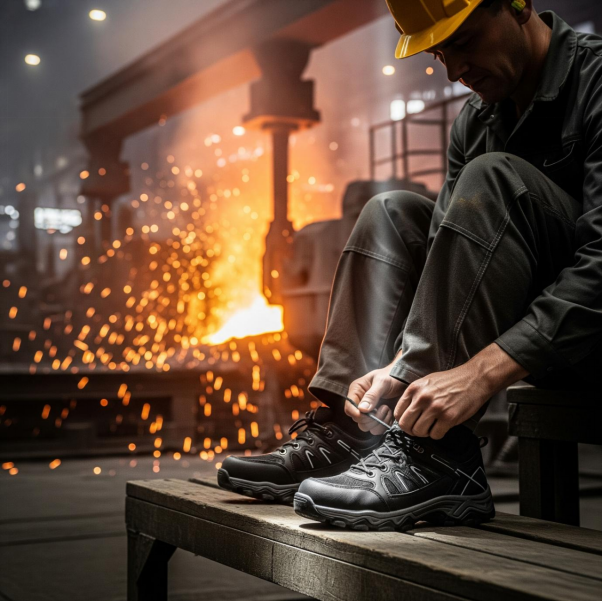What comes to mind when you think about steel plants, construction sites, and large-scale manufacturing hubs? The safety of course—that something can’t be negotiated. Those risky surroundings with massive furnaces, heavy machinery roaring in the background, and sparks flying around—let safety be a top priority.
While helmets, gloves, and other protective gear are non-negotiable, Best Safety Shoes are crucial too, keeping workers safe. Now the real debate starts—are Lightweight Industrial Safety Shoes suitable for use in heavy industries like steel manufacturing, or are they too bulky to provide the required level of protection?? Let’s dive deeper.
The Importance of Safety Shoes in Heavy Industry
The work environments, such as a steel plant, and workers are exposed to risks in daily activities. From hot surfaces and molten metal to falling apart and slippery floors, hazards exist at every step. This is an emergency to get a foot injury—even prolonged hours cause pain, leading to long-term disability. This even impacts the work productivity and compensation. Here comes the need for the Construction Site Safety Shoes
Traditionally, industrial safety shoes were bulky and heavy, but today, lightweight industrial safety shoes provide workers with great comfort all day. They not only provide strong protection but also reduce fatigue and improve productivity, making moves more efficient for workers.
Next in demand is the growing awareness of occupational health, where companies require precise safety solutions; Safety Shoes Good Quality addresses this need.
What Makes a Shoe “Lightweight”?
When it comes to Men's Safety Shoes—lightweight industrial safety footwear is mostly needed, here are the top manufacturers' ways to achieve balance.
Composite Toe Caps Instead of Steel
Traditionally, Safety Manufacturers in Indiawere into heavy and bulky safety shoes, but now are manufacturing safety footwear for workers with composite toes. They have replaced it with a steel top cap in safety shoes. Modern safety shoes use materials like fibreglass, Kevlar, and carbon fibre, which are strong and weigh less.
Advanced Sole Technology
Rather than using heavy rubber soles, the new generation of Best Safety Shoes is designed with PU-Polyurethane or thermoplastic polyurethane soles. These materials are of good quality, durable, slip-resistant, and light in weight.
Breathable and Strong Uppers
Safety shoes are commonly manufactured with leather, but are now also incorporating synthetic fabrics and advanced leathers. This makes them breathable and resilient against industrial hazards.
Ergonomic Design
Lightweight Industrial Safety Shoes are designed to keep workers maximally comfortable all day. They are manufactured with padded insoles, arch support, and anti-fatigue technology as precise features.

Can Lightweight Shoes Handle Heavy Industry Like Steel Plants?
It's conflicting like always—the answer depends on the shoe's design within the standards that make them suitable for work environments. The safety shoes aren’t one-size-fits-all but are designed for the specific role of the workers. Let’s break it down.
Impact and Compression Resistance
Typically, steel plants have a risk of heavy objects and machinery falling. Therefore, we need durable yet lightweight industrial safety shoes, which is why composite toe cap shoes are beneficial. Please continue to verify that the safety footwear meets international safety standards, such as EN ISO 20345 or ASTM, which ensures they are as effective as steel-toe shoes in terms of impact resistance.
Heat Resistance
It's one of the biggest challenges as steel plants are highly exposed to heated surroundings. So all lightweight safety footwear won’t work. Workers around furnaces or metal need heat-resistant safety shoes. The advanced Men's Safety Shoes are designed with heat-resistant soles and uppers.
Slip Resistance
Steel plants and heavy-duty worksites are oily, wet, and dusty. Therefore, go with the Best Safety Shoes that offer excellent slip resistance to prevent injuries and accidents. Safety shoes need to have dual-density PU or rubber soles, offering a strong grip.
Durability
That’s a common concern with Lightweight safety shoes: whether the footwear will last longer and be heavy-duty. If you are buying the best quality safety shoes, then it's worth it. The craftsmanship and product quality are of equal importance; this is maintained by reputed Safety Shoes Manufacturers in India, within risky, demanding work profiles and fields.
Worker Comfort
This can not be negotiated, no matter what it's about, safety shoes. Workers need to spend 10-12 hours a day at the worksite—that prolonged working duration strains the feet with pain and fatigue. If the shoes aren’t comfortable, it can reduce work efficiency. The lightweight safety shoes boost morale and productivity.
Indian Manufacturers Rising to the Challenge
Today, India has emerged as the global hub for safety footwear, exporting into regions like the Middle East, Europe, and Africa. Now, safety shoe manufacturers in India are focused on designing innovations that are light, durable, high in quality, and excellent in comfort.
Features often offered by leading Indian brands include:
- Lightweight composite toe caps
- Electrical hazard protection
- Oil and acid resistance
- Water repellence
- Anti-static properties
- Comfortable cushioning for long wear
Choosing the Best Safety Shoes for Steel Plants
When it's about a way to choose the Safety Shoes in Good Quality for the industrial sector, steel plants, and construction sites, here are the factors such as
Certification and Standards
Always check if the shoes comply with BIS (Bureau of Indian Standards), EN, or ASTM norms.
Toe Protection
Opt for steel or composite toes depending on the role and comfort preference. Composite toes are lighter and non-conductive.
Heat and Chemical Resistance
If working near furnaces, hot surfaces, or chemicals, ensure the shoes are specifically rated for such hazards.
Sole Quality
Look for dual-density PU, TPU, or rubber soles that provide grip, shock absorption, and resistance to oils and acids.
Comfort
Shoes should have cushioned insoles, breathable lining, and ergonomic design to reduce fatigue.
Durability
Choose from reputed safety shoe manufacturers in India known for producing long-lasting footwear.

The Final Verdict
Today, Lightweight Industrial Safety Shoes are no longer a trend, but a necessity and the future of workplace safety in India. The advancements in material science and design significantly impact the overall comfort and grip of workers, enabling high performance.
Whether it's a steel plant, construction site selecting the use is must to have the best safety shoes for workers profile will make workers safe from workplace hazards.
FAQs
Q1. Are lightweight safety shoes as safe as traditional heavy shoes?
Yes, suppose they meet certified safety standards (EN ISO, ASTM, or BIS). In that case, lightweight safety shoes with composite toes can offer equal protection as traditional steel-toe shoes, with the added benefit of comfort.
Q2. Can lightweight safety shoes be used in steel plants?
Yes, but it depends on the worker’s role. For general movement, inspections, and handling tasks, lightweight shoes are ideal. For direct furnace or molten metal exposure, specialized heat-resistant footwear is recommended.
Q3. Which is better: steel-toe or composite-toe safety shoes?
Steel toes are extremely strong but heavy. Composite toes are lighter, non-conductive, and equally impact-resistant. The choice depends on the nature of the job and comfort requirements.
